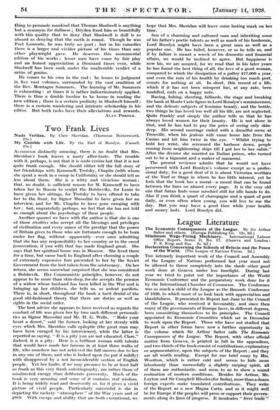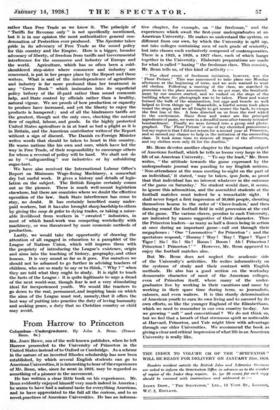'League Literature
The Economic Consequences of the League. By Sir Arthur Salter and others. (Europa Publishing Co. 12s. 6d.) Minimum Wage-Fixing Machinery. International Labour Declaration Concerning the Schools of Britain and the Peace of the World. (The League of Nations Union. 2d.) THE intensely important work of the Connell and Assembly of the League of 'Nations performed last year must not be 'allowed to throw completely into the shade other good work done at Geneva under less limelight. During last year we tried to point out the importance of the World Economic Conference and the preparatory work done for it by the International Chamber of Commerce. The Conference was as much a child of the League as the Brussels Conference Of 1920, to which most of us look back with appreciation and thankfulness. It presented its Report last June to the Council of the League, who received it favourably, and since then many of the governments of Europe have, in different degrees, been committing themselves to its principles. The Council. appointed its Economic Committee which sat in December to work Upon the Report. Those who have not studied that Report' in other forms have now a further opportunity in the volume which Sir Arthur Salter calls The Economic Consequences of the League. The Report, with other official- matter frOm Geneva, is printed in full in the appendices, and two-thirds of the book consist of contributions, explanatory- or argumentative, upon the subjects of the Report ; and they are all worth reading. Except 'for one brief essay by Mrs. Wootton, which is rather cold and seems to hide 'More laboriously than successfully a slightly- carping 'spirit, all' of them are enthusiastic, and seem to us -to show a sound- realization of modern conditions. Besides Sir Arthur, Mr. Layton and Sir Campbell Rhodes (for India), more than a dozen foreign experts make translated contributions. They write of the Report as a new Magna Carta, and SO 'it might well be for Europe if the peoples will press or support their govern- ments along its linel of *Ogress. If inculeates "freer traile-"- rather than Free Trade as we know it. The principle of "Tariffs for Revenue only" is not specifically mentioned, but it is in our opinion the most authoritative general con- demnation of Protection ever produced. The Spectator takes pride in its advocacy of Free Trade as the sound policy for this country and the Empire. Here is a bigger, broader advocacy of liberty, of freedom from tariffs and Governmental interference for the commerce and industry of Europe and the world. Agriculture, which has so often been a cold- shouldered step-sister where commerce and industry are concerned, is put in her proper place by the Report and these writers. What is said of the interdependence of agriculture and industry is far more profound than her treatment in any "Green Book" which insinuates into its superficial policy bribery of the ill-paid rather than sound economic help, and State control by officials rather than a healthy, natural vigour. We see proofs of how production or capacity to produce have increased, and yet the liberty to enjoy the products is hampered ; and of all the hindrances tariffs are the greatest, though not the only ones, checking the natural flow of capital, labour, and goods. In the highly protected United States agriculture is in at least as bad a plight as it is in Britain, and the American contributor writes of the Report without a sign of discord. The Danish ex-Foreign Minister writes words that should be taken to heart in this country. He warns nations like his own and ours, which have led the way in Free Trade, of their responsibility to encourage others for whom a reversal of policy will be hard. We shall not do so by "safeguarding" our industries or by subsidizing sugar-beet.
We have also received the International Labour Office's Report on Minimum Wage-fixing Machinery, a somewhat dry but useful work. It gives a history and details of legis- lation on the subject. The British Empire certainly comes out as the pioneer. There is much well-meant legislation elsewhere, but there are countries where we doubt the effective operation of the law. Such State interference has come to stay, no doubt. It has certainly benefited many under- paid workers, but it has also brought sharp hardship to others by giving the coup de grdce to dying trades, or taking a miser- able livelihood from workers in " sweated " industries, in most of which hand-work was competing wretchedly with Machinery, or was threatened by more economic methods of production.
Lastly, we would take the opportunity of drawing the attention of all engaged in education to a pamphlet of the League of Nations Union, which will impress them with the propriety of introducing the League's existence, origin and aims into the teaching of history, geography, and other lessons. It is very sound so far as it goes. For ourselves we should not be ashamed to go further in advising teachers of children, who are so ready to say or to think, " Why ? " when they are told what they ought to study. It is right to teach the facts of the League : it is quite legitimate to urge a dread of the next world-war, though fear is not a very stimulating ideal for inexperienced youth. We would him teachers to go down to the real, permanent, and inspiring basis on which the aims of the League must rest, namely, that it offers the best way of putting into practice the duty of loving humanity and seeking peace, a duty that no Christian country or child may avoid,



































 Previous page
Previous page